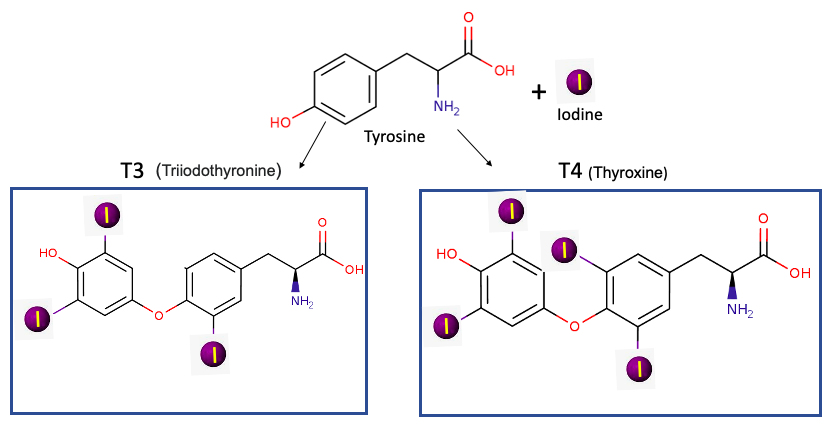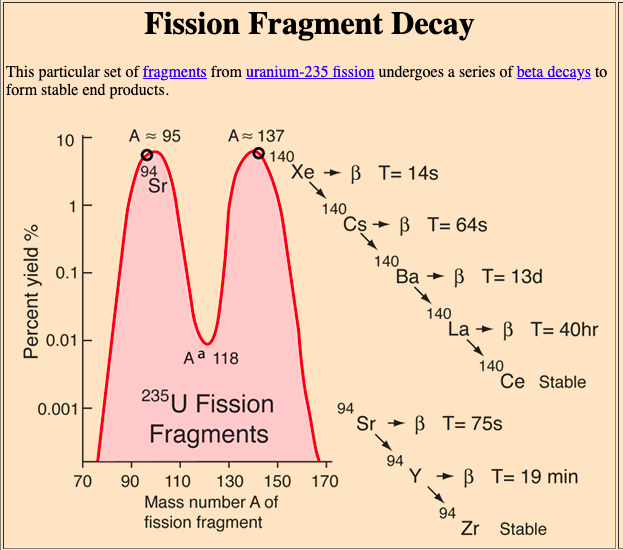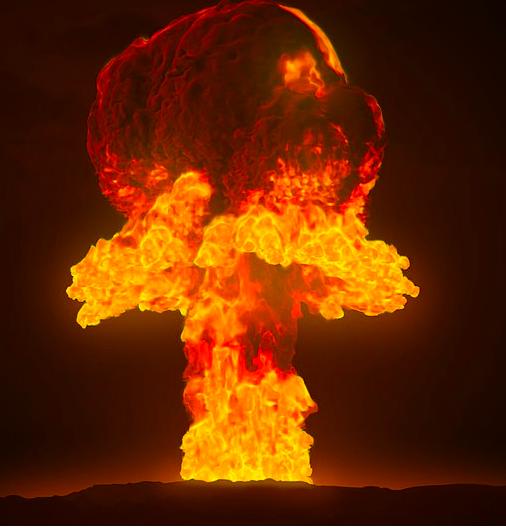As if they don't have enough to worry about, Ukrainians, fearing that Vladimir Putin will use some sort of nuclear weapon in the almost two-month war, are rushing to buy potassium iodide pills to protect them against radiation poisoning. If only it were that simple.
The pills are helpful, but not they are not an umbrella against all radiation-related illnesses, only one: thyroid cancer, which happens to be one of the most benign forms of cancer anyhow. The five-year survival rate for people with localized thyroid cancer is 100%, but that doesn't mean that you want to get it. People who think that iodide tablets are going to protect them from radiation poisoning from a nuke are seeing only part of the picture.
Why Buy Potassium Iodide?
Much of the iodide (1) you consume (about 80%) ends up in the thyroid gland, which is specifically designed to convert iodide/iodine into thyroid hormones (Figure 1). So, when you saturate your thyroid with stable iodide, it will be far less likely to slurp up any other radioactive iodine that may enter your body (below).

Figure 1. A simplified biochemical pathway showing the conversion of tyrosine (an amino acid) into the two principal thyroid hormones, T3 and T4.
2. Why is Potassium Iodide Protective?
When 235U decays (as in a nuclear bomb), the uranium atoms split, producing an enormous amount of energy as well as a good assortment of other elements and their isotopes, some stable, some not. One of these elements formed is iodine, but it is not the nice, stable, antiseptic 127I, which comprises 99+% of all iodine found on earth. Instead, it is icky 131I, which is also radioactive and spits out high-energy beta particles in the process of forming harmless xenon gas. The beta particles are bad news; they can penetrate the skin and blow up any DNA that happens to be in the way. Here are the nuclear equations that are responsible for the formation of 131I.
Step 1: Uranium-235 (the rare, unstable isotope) gets a nudge from a slow-moving neutron. Then, BOOM! All kinds of energy (in the form of radiation) plus dozens of unstable isotopes of multiple radioactive elements are given off, including iodine-131.

Step 2: Iodine-131 (radioactive, unstable) decays and is taken up by the thyroid gland, where it damages cellular DNA, possibly leading to cancer.

Figure 2. Equation #1: When 235U explodes, it gives off numerous smaller elements (fission) as well as enormous amounts of energy. One of the elements formed is 131I, an unstable isotope of iodine. Equation #2: 131I also decays, but in a different way. It expels a beta particle, which penetrates skin and damages DNA.
When is Potassium Iodide (KI) Protective?
While people in Ukraine may think that KI pills will help them avoid all sicknesses and cancers resulting from a nuclear explosion this is not the case. With the exception of the thyroid, it will not. Potassium iodide only protects against iodine-131, which is only is only one component in the complex, deadly gmish given off by the explosion [SEE READER LETTER BELOW]. Although there are some medications used to treat other forms of radiation sickness, this is not the kind of prescription you want to be filling.

Some of the radioisotopes given off when U-235 explodes. Source: HyperPhysics
The only way to be protected from the dreadful effects of nuclear weapons is not to use them in the first place. Are you listening, Vlad?
NOTE:
(1) Molecular iodine would also be taken up in the thyroid gland, but most supplements are potassium iodide, not iodine itself.
UPDATE 4/22/22
Mr. Alan Morris, the President of Anbex, the country’s leading supplier of potassium iodide for radiation protection, emailed me with his opinion that although my conclusion that KI treats only thyroid cancer is correct, he believes that I have understated the benefits of potassium iodide. I thank him for his contribution. Here are some of Mr. Morris' key points:
1. You omit the crucial fact that thyroid damage was virtually the only medical consequence of the Chornobyl accident among individuals located more than a few miles from the nuclear plant. In fact, apart from thyroid cancer, no other increased cancers have been reported in statistically significant amounts.
2. According to the US Nuclear Regulatory Commission (NRC) (quoting the World Health Organization), that (ten years after Chernobyl), “except for thyroid cancer, there has been no confirmed increase in the rates of other cancers… that have been attributed to releases from the accident. In addition, there is no evidence of any excess hereditary diseases in children born after the accident.”
3. In fact, among children unable to get KI at the time of Chornobyl, at least 6000 cases of thyroid cancer are known. Sure, very few children died from the disease, but irradiated children who developed cancer have had their lives seriously impaired.
4. Millions of children received KI following Chernobyl. Its effects were studied, and the NRC found that “Thousands of measurements of I-131 activity in the thyroids of the exposed population suggest that the observed levels were lower than those that would have been expected had this prophylactic measure not been taken."
5. KI’s value in case of a reactor accident is unambiguous, but the need for the drug is equally important when I-131 is released by a nuclear weapon.
6. KI works, which is why the American Thyroid Association, The National Academy of Sciences, the American Academy of Pediatrics, the American Cancer Society, the FDA, and many, many other organizations strongly support stockpiling and wide availability of the drug.
7. To learn more, and to see the sources for the quotes included here, please see www.KIFacts.com and www.anbex.com. Of course, if you have questions or comments.




